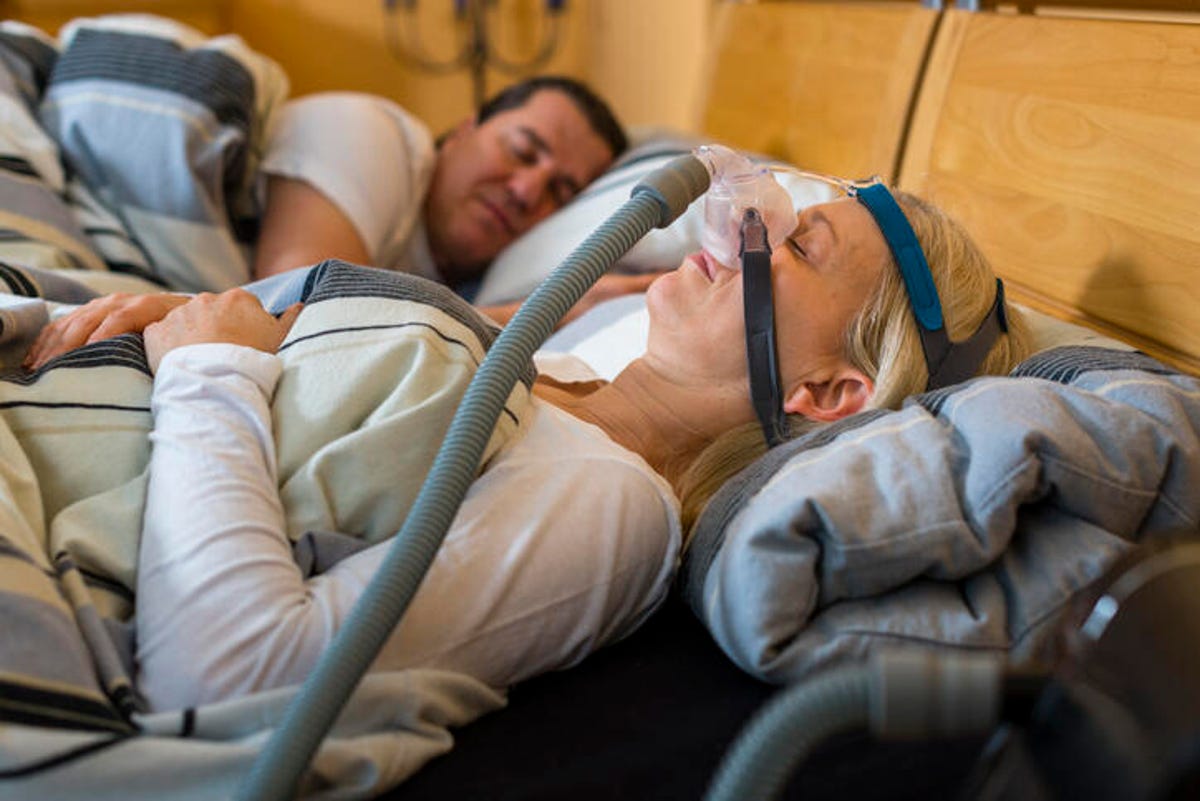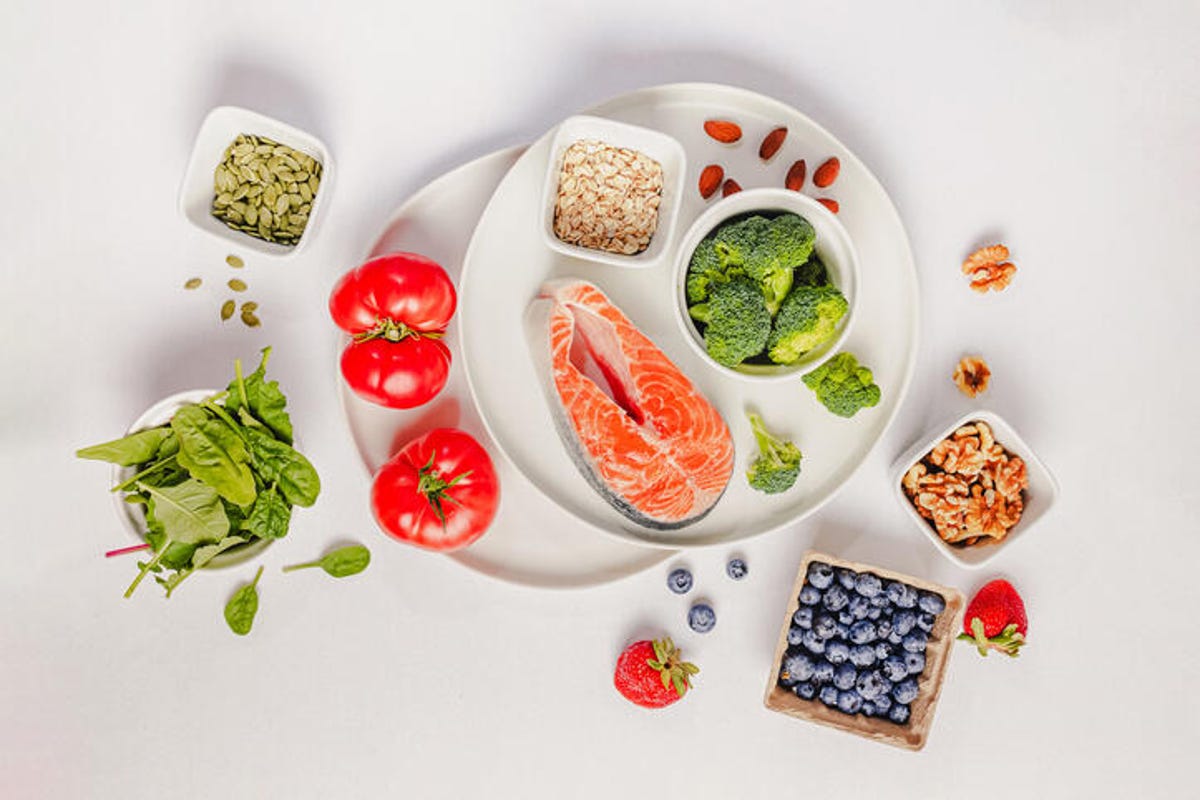Sleep apnea is a chronic sleep disorder defined by frequent interruptions in breathing that compromise sleep quality. Experts agree that metabolic, genetic and behavioral factors contribute to sleep apnea. Now diet is emerging as a new risk factor.
A study published in ERJ Open Research found that those who eat a diet full of vegetables, fruits, nuts and whole grains are 19% less likely to develop obstructive sleep apnea. Conversely, following a diet filled with processed foods and sugary drinks will raise your risk.
“This study is very promising. Most focus on OSA has been strictly about calorie restriction and weight reduction, whereas this is about healthy dietary patterns,” said Dena Champion, MS, RDN, LD. Champion is a registered dietitian at The Ohio State University Wexner Medical Center.
Let’s dig into how a plant-based diet can drop your risk for obstructive sleep apnea in the future and how to change your diet today.
What is sleep apnea?
There are three types of sleep apnea. The most common type is obstructive sleep apnea, which occurs when the tongue and throat muscles relax too much and block the airway. Central sleep apnea is less common and occurs when the brain signals don’t properly reach the muscles that control breathing. The least common form is called complex sleep apnea syndrome and is a combination of the two.
The study linking plant-based diets to reducing sleep apnea is only relevant to OSA.
The top symptoms of sleep apnea are:
- Loud snoring
- Breathing interruptions
- Gasping or choking sounds like sleeping
- Fatigue
- Feeling tired after a full night of sleep
- Difficulty concentrating
The gold standard for sleep apnea treatment is CPAP machines that ensure your airways stay open while you sleep. Untreated sleep apnea can lead to chronic health conditions like heart disease, hypertension, stroke and type 2 diabetes.
Read more: CPAP machines: How to pick One You Won’t Hate

Can a plant-based diet help with sleep apnea?
One of the supplementary recommendations for obstructive sleep apnea management is losing weight through diet and exercise. For many people, when they hear “diet,” they focus on calorie restriction to drop weight. However, the type of diet they follow is rarely considered. This study is the first to analyze how a plant-based diet could influence someone’s risk of developing OSA.
Though the findings suggest that a plant-based diet can lower sleep apnea risk, it’s not causal.
“We do not know whether these findings were due to the absence of meat altogether or simply because participants ate nutritious plants that are high in vitamins and minerals on a regular basis,” said Dan Gartenberg, Ph.D., Sleep Science Advisor at CPAP.com.
Read more: Foods That Make Being Vegan and Increasing Your Protein Intake Easy
A 2018 study published in the American Journal of Lifestyle Medicine discovered that those with high-fat diets that included processed red meats had worsened sleep apnea. However, leaner meats were less likely to have the same effect.
“It is quite possible that a healthy meat-based diet would have a similar impact on OSA as a healthy plant-based diet. The reasoning is that increased inflammation plays a strong role in OSA severity. There is evidence to suggest that both types of diets have the potential to reduce this inflammation, theoretically leading to a decrease in sleep apnea severity,” Gartenberg told CNET.
A plant-based diet can reduce your risk of airway obstruction
While this study does not prove a causal relationship between lower instances of sleep apnea and plant-based diets, the reality is that diets rich in vegetables, fruits, nuts and whole grains are good for you. You should strive for this type of diet when you can.
But how could these foods help your airways stay open?
Gartenberg explained that these foods help neutralize free radicals in the body and lower oxidative stress. A proper balance of free radicals and antioxidants is essential for healthy functioning. Reducing free radicals reduces inflammation and obesity, two of the biggest risk factors for OSA.
“These two components have been linked to swelling and muscle weakness throughout the head and neck. This leaves the airway more susceptible to blockages by the tongue, soft palate, and surrounding soft tissues,” Gartenberg added.
Gartenberg pointed out three ways eating a plant-based diet will drop your risk of airway blockers: by shrinking excess fat buildup around the neck, lessening swelling of the upper airway and boosting muscle strength in the neck and mouth.

How to adapt your diet to lower sleep apnea risk
Obesity is one of the largest risk factors for sleep apnea. Making positive diet changes that implement nutrient-rich foods that are high in antioxidants and reduce inflammation can also lower blood pressure, heart rate and cholesterol levels.
While the study has found a link between a plant-based diet and a 19% reduction in sleep apnea, it’s essential to recognize that a plant-based diet doesn’t suit everyone’s nutritional needs or lifestyle. That said, it’s a good idea to aim for a healthy balance of plant-based meals. If you want to supplement your diet with more plant-based meals without eliminating meat, you should choose fatty fish, which is high in omega-3 fatty acids.
If you’re looking for a framework to follow, the Mediterranean diet has been found to lower sleep apnea symptoms.
Read more: Master the Mediterranean Diet With the Help of These Tips and Recipes
Cut back on processed foods
“With the research we have right now, the best diet advice is this: If you are concerned about your risk for sleep apnea, stay away from processed sugary foods and high-fat processed meats. Instead, focus on foods that fuel your body, boost your immune system, and fight free radicals,” said Gartenberg.
Completely cutting out processed foods isn’t realistic for many of us. Whether it’s because you’re busy or tired or just craving a burger, it’s OK to have processed foods occasionally. However, you should aim for moderation not only for sleep apnea but for your overall health.
Read more: 7 Money-Saving Tips for Eating Healthily on a Budget
Focus on anti-inflammatory foods
According to Harvard Health Publishing, red and processed meats, fried foods and refined carbohydrates cause inflammation. Try to balance these foods with healthier options.
Foods that have anti-inflammatory properties are:
- Fruits like blueberries, strawberries, oranges and cherries
- Leafy greens like kale, collards and spinach
- Nuts
- Fatty fish, including salmon and tuna
- Tomatoes
Read more: Eat These 5 Foods to Naturally Boost Your Heart Health
If you don’t know where to start, start small by swapping out your protein at dinner. Or substituting your afternoon snack with a healthy alternative like blueberries or nuts.

Too long; didn’t read?
Don’t ignore your obstructive sleep apnea. It can lead to chronic health conditions like diabetes or heart disease if left untreated. While wearing a CPAP machine is the recommended treatment to ensure you get quality sleep, choosing to adjust your diet will also ease symptoms.
This study reinforces the importance of recognizing that your diet can affect your sleep quality. However, Champion stressed the lack of causality between a plant-based diet and reduced sleep apnea.
“We can derive some important information about the associations of a healthy diet and OSA, but more research is needed to determine if the diet studied actually caused reduced OSA,” Champion added.
You don’t need to worry about cutting meat out of your diet if that doesn’t work for your lifestyle. Instead, strive for balance. Focus on healthy fats, proteins, and foods that help meet your nutritional needs. Making changes in your diet will not only impact your sleep apnea risk, but it will also benefit your overall health and mental wellness.




















+ There are no comments
Add yours